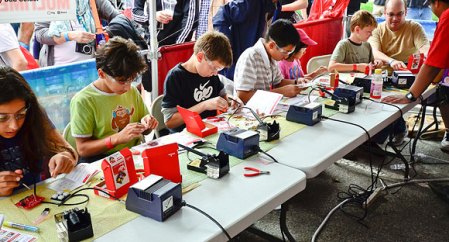
Sparkfun Electronics has launched an educational web site with a full curriculum of classes being held at Sparkfun Headquarters. If you don’t live nearby, no problem. You can download the entire curriculum as well. It appears that they will have a tutorial section for those who prefer a per-project approach, but that area is still “coming soon”. We love to see people educating others. Good job Sparkfun, looking forward to seeing more content on there.















As a beginner myself I have a question for the experts around here: I solder with lead-solder (Its easier for me) and sometimes wonder If I (like the kids in the image) should use a safty glas too while soldering. I sometimes have to get really near the soldering-point as my eyes are not that good in microcontroller-sizes. But I have a greater fear if all that lead could harm to my lung and a (surgical) mask would be also a good idea. What kind of mask should I use? Is a FFP1 certification enough or has it to me a FFP4 like you find many on Amazon with this feature.
Thanks
I believe the health risks from the lead is very small, but instead it’s the flux which normally is dangerous. Most solder apparently use Rosin based flux core which should be very unhealthy to inhale.
I normally just solder with the window open and a fan running.
Safety goggles are probably good to use, so you don’t get those nasty flying droplets in your eyes. I have never used them, but I probably should have.
^^^ this
There’s virtually zero risk from lead vapour. Lead residue from handling solder is a bit of a concern, but fine as long as you wash your hands before eating or touching your eyes/mouth.
Rosin fumes can be fairly serious. The main risk is ‘occupational asthma’, which is an acquired allergy to chemicals in fumes. It wont ruin your life but you can end up in a situation where you can’t work around solder. Good ventialation and extraction fans can mitigate the risks, but if you solder regularly, you really need a benchtop extractor/filter.
This is way cool.
Not trying to troll anyone here, but even the “advanced” content isn’t as advanced as I believe it should be. I’m sure they’ll add more to the curriculum in the future, right?
I mean, I know they probably make more money from the Arduino shields and other pre-assembled junk, but surely they’re able to step away from that for the sake of teaching! They do sell some discrete components, so why not? The most advanced thing I found was their electrical/computer engineering handout, and it contained information that would seem trivial to even someone in high school taking a digital electronics class!
…FWIW, I’m pretty drunk so whatevs.
Some of us never got a chance to do digital electronics, or any kind of electronics in high school. Plus it looks like it’s aimed at a younger audience than that, even.
I bet if you took an in depth look a the economics of hobby electronics you would find that there is the most money in the low end stuff. I’m sure a lot of money is made from parents who buy stuff for their kids because they think it will be good for them (and rightly so) to learn about electronics. I imagine this is the way to sell the most units, only a very small percentage of kids will go on to want to learn about intermediate and advanced topics and for them I think they will grow out of sparkfun and just buy cheaper stuff from mouser/digikey.
Cheers!
I think that with this education they will make more customers for them. This thing is sure.